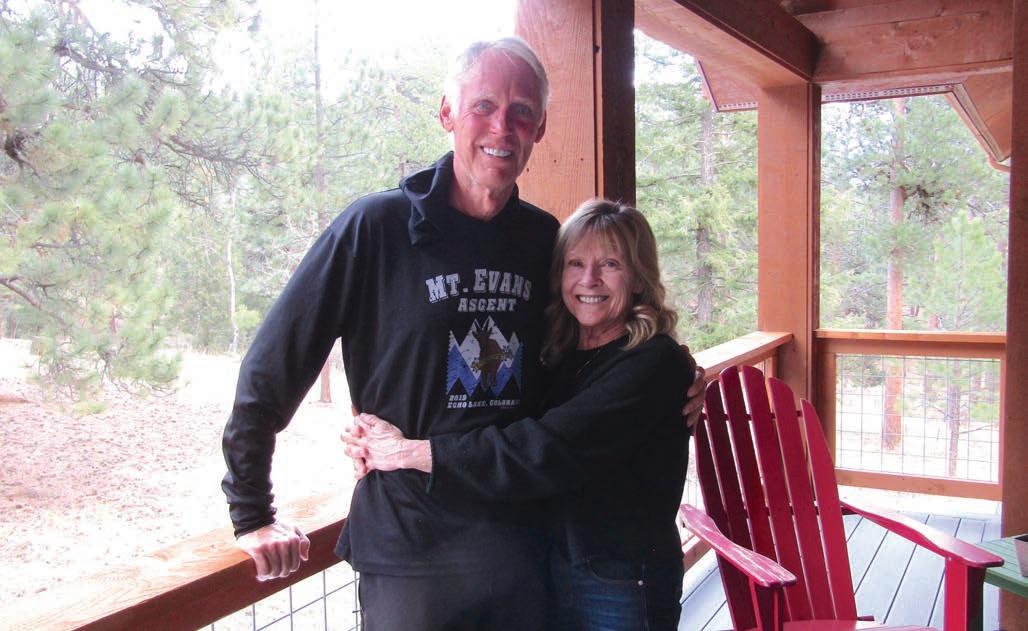
3 minute read
Taking an Alzheimer’s diagnosis ‘a mile at a time’
Evergreen’s
BY DEB HURLEY BROBST DBROBST@COLORADOCOMMUNITYMEDIA.COM




Mark Macy is a ghter.
e Evergreen resident always has been driven to succeed as an attorney, an endurance athlete and a devoted family man. Now at age 69, he continues his drive to succeed in his battle against Alzheimer’s disease.
He believes that his green diet, exercise and positive attitude will help him do what many others haven’t: beat the disease.
“Some people think I’m nuts,” said Macy, 69, who everyone calls Mace. “I believe I can beat it. If I don’t, I’m still a happy guy.” at’s why son Travis Macy, a 2001 Evergreen High School graduate and former EHS English teacher, decided to write a book with Mace about their journey called “A Mile at a Time: A father and son’s inspiring Alzheimer’s journey of love, adventure and hope.”
Mace has lived in Evergreen since 1980 with Pam, his high school sweetheart and wife of 46 years. Mace still runs regularly, sometimes on the family’s six-acre property and sometimes with friends who help keep him steady and on track.

When Mace got his diagnosis in 2018 — considered early-onset Alzheimer’s disease because he was 64 — the family decided it was not going to hide from the disease, friends or the community.
Travis and Mace travel around the country speaking about Alzheimer’s disease, and they will be at the Alzheimer’s Foundation of America’s
Alzheimer’s & Caregiving Educational Conference on May 17. e family also will be at the Evergreen Taphouse for a book signing that evening.
“To his credit, (Mace) decided he was not going to be ashamed of Alzheimer’s and not going to hide it,” Travis said. “He’s continued to do that, and honestly it’s turned out that his treatment has been communicating with other Alzheimer’s families.”
Dr. Allison Reiss with the Alzheimer’s Foundation of America’s Medical, Scienti c and Memory Screening Advisory Board said Alzheimer’s disease is not always obvious, especially at rst. e line between forgetfulness and an Alzheimer’s disease diagnosis would be when someone suddenly doesn’t know where they are, Reiss said. ey wander o or try to go someplace from the past.
“We all get more forgetful, and sometimes we get so much clutter in our brains that we may do something wrong or di erent like misplace our keys or forget something on the chore list,” she explained.
Another big one, she added, is not getting words right.
“Not just mispronouncing,” said Reiss, who is an associate professor of medicine at the NYU Long Island School of Medicine, “but when you can’t nd the words or when you forget something basic like your own phone number. After a point, it becomes clear that it cannot be attributed to a normal situation.”
Before the diagnosis
Mace spent his life as a hard-working trial attorney, forsaking sleep to do it all – spending time with his family while working long hours at his practice. He began competing in adventure racing in the 1980s when the grueling sport was forming and competed in all eight Eco-Challenge races from 1995 to 2002.
Travis, following in his dad’s footsteps, became an accomplished ultra-athlete, traveling around the world to race professionally. Prior to Mace’s diagnosis, the father and son did hundreds of the same races, mostly solo events in which both
“We did lots of the same adventure races in which Dad competed on a team with friends and I raced for the win with a competitive team,” Travis
In 2019, a year after Mace’s diagnosis, the duo traveled to Fiji to race in the revived Eco-Challenge, a 10-day, 417-mile race with 280 competitors who traversed mountains, rivers, swamps and oceans, the rst time the two had competed on the same team. While the team did not nish, Travis considered it a win because endurance racing doesn’t have a category for competitors with Alzheimer’s disease.
The beginning
Mace said leading up to his diagnosis, he noticed he wasn’t talking properly, making his trial-attorney career more di cult.
“Word nding had become more di cult for him,” wife Pam said, “but not to where anyone would notice.”
Mace saw a neurologist, and a brain MRI came back normal, so they thought he was in the clear. But the symptoms kept persisting: things like Mace couldn’t read a map, and he suddenly had di culty pulling a car into a parking space.
10









